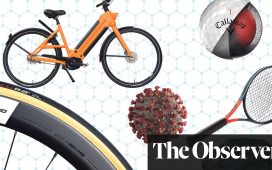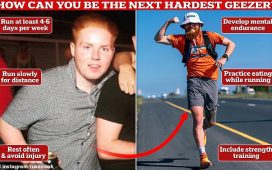Hopes are soaring that a Covid vaccine is within reach, following news that an interim analysis has shown Pfizer/BioNTech’s candidate was 90% effective in protecting people from transmission of the virus in global trials.
The vaccine performed much better than most experts had hoped for, according to the companies’ analysis, and brings into view a potential end to a pandemic that has killed more than a million people, battered economies and upended daily life worldwide.
The data is from an interim analysis and the trial continues into December but the headline results were emphatic. Regulators will be looking to process an emergency licence application at record speed.
Global stocks surged to record highs on the news, while companies that have become synonymous with lockdowns in the west, including Zoom’s video conferencing and food delivery firms, saw falls in their value.
John Bell, Regius professor of medicine at Oxford University, who is involved with the Oxford vaccine, said that the Pfizer team had shown “an amazing level of efficacy” and it could mean a return to normality by spring. “I’m the first guy to say that but I will say it with some confidence,” he told the BBC.
Manufacturing is already under way. Pfizer said they expect to supply globally up to 50m vaccine doses in 2020 and up to 1.3bn doses in 2021. Countries will decide who they prioritise for vaccination. In the UK, the joint committee on vaccination and immunisation has recommended that – presuming the vaccines work well enough in elderly people – the first vaccines go to care home workers and residents, followed by anybody over 80 and other health and social care workers. After that, people are expected to get them in decreasing age order.
The news comes too late to help Donald Trump’s re-election campaign in the US, but the vice-president, Mike Pence, tried to claim their administration’s Operation Warp Speed programme had helped the vaccine’s development. Pfizer denied the suggestion.
“We were never part of the Warp Speed,” Kathrin Jansen, a senior vice-president and the head of vaccine research and development at Pfizer, said in an interview. “We have never taken any money from the US government, or from anyone.”
BioNTech, the small biotechnology company that is the originator of the vaccine, was founded by two married German scientists, Uğur Şahin and Özlem Türeci, both born to Turkish immigrant parents, and the Austrian oncologist Christopher Huber. It originally set out to develop new types of immunotherapy for cancer, but has concentrated its capacities on the race for a Covid-19 vaccine.
There are so far no safety concerns around the vaccine, with the two companies reporting no serious side-effects. The high percentage of those protected makes it especially compelling. Regulators have previously said they would approve a vaccine that has just a 50% effectiveness rate – protecting half of those who get vaccinated.
“Today is a great day for science and humanity. The first set of results from our phase 3 Covid-19 vaccine trial provides the initial evidence of our vaccine’s ability to prevent Covid-19,” said Dr Albert Bourla, the Pfizer chairman and chief executive.
“We are reaching this critical milestone in our vaccine development programme at a time when the world needs it most with infection rates setting new records, hospitals nearing over-capacity and economies struggling to reopen.”
Other scientists tried to marry caution with their obvious excitement at the early results, warning that the full data was not yet available and that the trial was continuing.
“In the absence of any data from Pfizer and BioNTech, we have to take these very exciting claims at face value,” said Dr Simon Clarke, an associate professor of cellular microbiology at the University of Reading. “It seems highly unlikely that a major pharmaceutical company would get such eagerly awaited news wrong.”
Prof Peter Horby of Oxford University, who runs the Recovery Covid drug trial, said it seemed like an important moment.
“This news made me smile from ear to ear,” he said. “It is a relief to see such positive results on this vaccine and bodes well for Covid-19 vaccines in general. Of course we need to see more detail and await the final results, and there is a long, long way to go before vaccines will start to make a real difference, but this feels to me like a watershed moment.”
As news of the breakthrough buoyed the scientific community, Brazil’s health regulator said it had suspended a clinical trial for China’s Sinovac coronavirus vaccine citing a severe adverse event. Trial organisers said there had been a death but it was unrelated to the vaccine.
The health regulator, Anvisa, said on Monday the “adverse event” took place on 29 October but did not specify if the incident took place in Brazil or in another country. It also did not give an indication of how long the suspension of the large late-stage trial might last.
Pfizer/BioNTech’s mRNA vaccine, which uses the genetic code rather than any part of the virus itself, has been one of the leaders in the global vaccine race. Interim results are also expected this month or in early December from trials for the Oxford University/AstraZeneca vaccine, which is based on a different technology.
The phase 3 trials have involved more than 43,000 people and are intended to establish whether the vaccine works. Volunteers are given either the Covid vaccine, which was administered in two shots about three weeks apart, or a placebo alternative such as the meningitis vaccine, and neither they nor their doctors know which they have had.
There have been concerns that black and minority ethnic populations are particularly vulnerable to Covid. Approximately 42% of global participants and 30% of US participants in the trials have racially and ethnically diverse backgrounds and appear to have been as well-protected as everyone else, the company says. But one important unanswered question is how long the vaccine will last.
The US and UK both welcomed the development but urged patience.
“I congratulate the brilliant women and men who helped produce this breakthrough and to give us so much cause for hope,” the US president-elect, Joe Biden, said. “It is also important to understand that the end of the battle against Covid-19 is still months away … a mask remains a more potent weapon against the virus than a vaccine. Today’s news does not change this urgent reality.”
The UK’s prime minister and deputy medical adviser warned that nobody should assume the pandemic was over and let down their guard. “We can’t let our enthusiasm run away with us,” said Boris Johnson, adding that the public must continue to observe the lockdown restrictions. Prof Jonathan Van-Tam said the results showed the vaccine prevented disease, but “we don’t know what this means yet for when we can get life back to normal … please don’t relax.”
Many countries already have orders for the Pfizer/BioNTech vaccine. The UK has bought 40m doses – enough for 20 million people because two doses are required. The EU has secured 200m doses, which it will distribute. The companies have a $1.95bn (£1.5bn) contract with the US government to deliver 100m vaccine doses beginning this year.
Low-income countries could face problems, however, because the vaccine needs ultra-cold chain; it must be stored at -70C. The BioNTech chief executive, Uğur Şahin, has said his company is researching whether the vaccine might be able to survive for up to five days at a normal fridge temperature of 4C.
In Germany, the government is planning to set up vaccination centres equipped with ultra-low-temperature freezers for the first phase of vaccinations.














